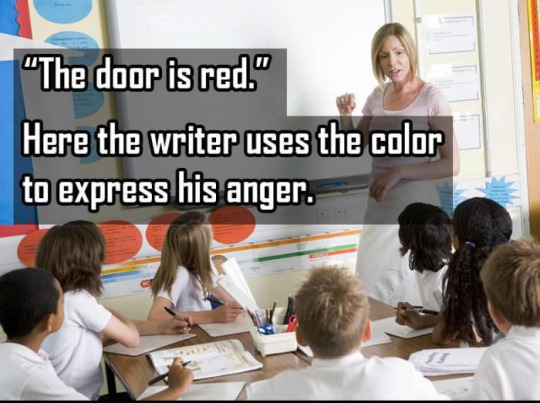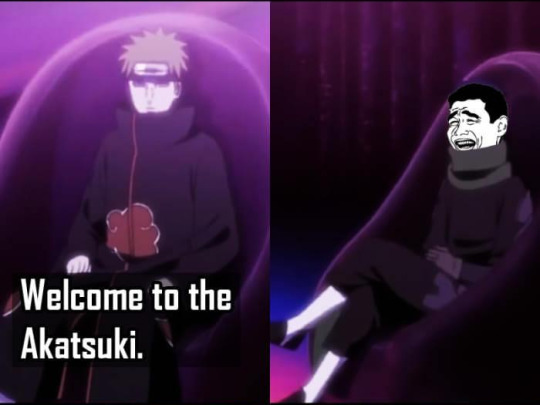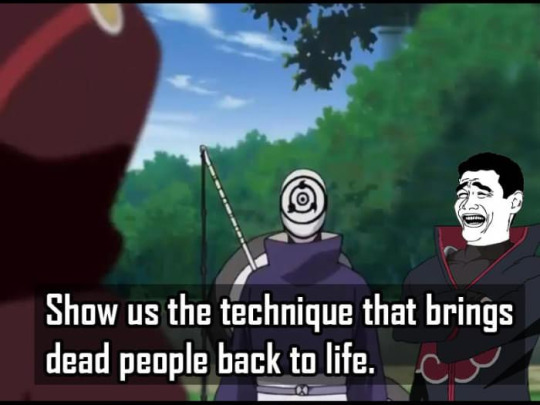Text
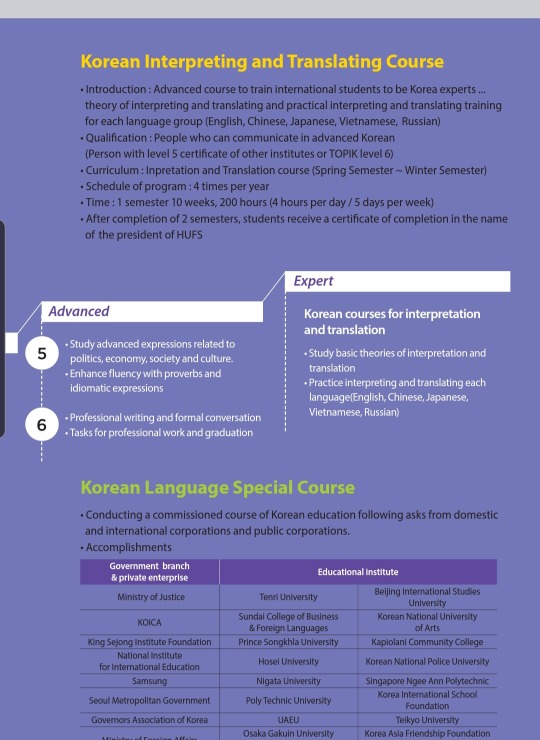
Sometime ago I found that Hankuk University of Foreign Studies' Korean Language Program had this course. It's only 6 months long, but it wasn't until a few days ago that I saw their new leaflet.
I think it could be good for someone interested in translating/interpreting that needs practice before an Interpreting/ translation school entrance exam. Or to get some idea of what are they are getting into.
I contacted the program a few months before and it seemed like a lot of people ouside of the Chinese and Japanese didn't know about the program so I decided to share it here.
9 notes
·
View notes
Text

Sometime ago I found that Hankuk University of Foreign Studies' Korean Language Program had this course. It's only 6 months long, but it wasn't until a few days ago that I saw their new leaflet.
I think it could be good for someone interested in translating/interpreting that needs practice before an Interpreting/ translation school entrance exam. Or to get some idea of what are they are getting into.
I contacted the program a few months before and it seemed like a lot of people ouside of the Chinese and Japanese didn't know about the program so I decided to share it here.
9 notes
·
View notes
Text
730 days
It has been two years, and I still cry some nights.
It has been two years since we regretted not doing more to save you.
It has been two years and I still can't believe you're actually gone.
It has been two years since many people felt like they lost a part of themselves, because they did.
It has been two years since we last saw your warm smile.
It has been two years since we last had your wonderful presence.
It has been two years, yet we failed to change the world to avoid more tragedies like you.
It has been two years and you are still remembered as the great human you are.




You did well, Jonghyun.
And we will love you forever.
623 notes
·
View notes
Text
I think my favorite experience with an American was when I said “I’m from Finland” and she said “Oh so do you speak Scandinavian?” and I swear to god nothing will ever surpass that moment
62K notes
·
View notes
Text
Translation Masterpost
So you want to be a translator: online resources and books for translation students. Aside from translation specific resources, there are also related materials you can look into to improve your work and knowledge. Some Interpreting material in here as well.
As a disclaimer, I have not read all of these books (yet). The most highly recommended will be bolded. Keep in mind I am entering my second year in university and have much left to discover. Feel free to suggest titles, blogs and websites for the masterpost!
I will be linking this masterpost in my sidebar and updating it often. Remember to check book ratings and reviews before purchasing!
Translation Books:
A Practical Guide to Localization by Bert Esselink
Becoming A Translator by Douglas Robinson
Companion Book for Translators and Interpreters: 100+ Key English-Spanish Medical Terms by José Luis Leyva
Companion Book for Translators and Interpreters: the 1000+ Key English-Spanish Legal Terms You Will Need to Know by José Luis Leyva
Conference Interpreting by Andrew Gillies
Experiences in Translation by Umberto Eco
Exploring Translation Theories by Anthony Pym
Found In Translation by Natally Kelly and Jost Zetzsche
How to Succeed as a Freelance Translator by Corinne McKay
In Other Words: A Coursebook On Translation by Mona Baker
Introducing Translation Studies by Jeremy Munday
Introduction to Court Interpreting by Holly Mikkelson
Is That A Fish In Your Ear? by David Bellos
Note-taking for Consecutive Interpreting by Andrew Gillies
Research Methods in Interpreting by Sandra Hale and Jemina Napier
The Entrepreneurial Linguist: The Business School Approach to Freelance Translation by Judy and Dagmar Jenner
The Poetics of Translation by Willis Barnstone
The Prosperous Translator by Chris Durban
Theories of Translation: An Anthology of Essays
Thoughts on Translation by Corinne McKay
Translating Literature by André Lefevere
Translation: A Multidisciplinary Approach by Juliane House
Translation, History & Culture by Susan Bassnet
Translation Quality Assessment: Past and Present by Juliane House
Why Translation Matters by Edith Grossman
19 Ways of Looking at Wang Wei: How A Chinese Poem Is Translated by Eliot Weinberger and Octavio Paz
Translation Books in Portuguese:
A Tradução Literária por Paulo Henriques Britto
A Tradução Vivida por Paulo Rónai
Conversas com Tradutores por Ivone C. Benedetti e Adail Sobral
Escola de Tradutores por Paulo Rónai
Fidus interpres por Fabio M. Said
Guia Prático de Tradução Inglesa por Agenor Soares dos Santos
Línguas, Poetas e Bacharéis: uma Crônica da Tradução no Brasil por Lia Wyler
Oficina de Tradução: A Teoria na Prática por Rosemary Arrojo
O Que é Tradução por Geir Campos
Os Labirintos da Tradução: A Legendagem Cinematográfica e a Construção do Imaginário
Perdidos na Tradução por Iuri Abreu
Procedimentos Técnicos da Tradução por Heloísa Gonçalves Barbosa
Quase a Mesma Coisa por Umberto Eco
Sua Majestade, O Intérprete por Ewandro Magalhães Jr.
Teorias Contemporâneas da Tradução por Edwin Gentzler
Tradução, Ato Desmedido por Boris Schnaiderman
Tradução e Adaptação por Lauro Amorim
Tradução e Cultura por Cynthia Ann Bell-Santos
Tradução e Dialogismo por Heber de Oliveira Costa Silva
Tradução e Multidisciplinaridade por Marcia A. P. Martins
Tradução de Humor: Transcriando Piadas por Marta Rosas
Tradução Para Dublagem por Ana Carolina Konecsni
Traduzir com Autonomia por Adriana Pagano, Célia Magalhães e Fabio Alves
Vocabulando - Vocabulário Prático Inglês-Português por Isa Mara Lando
Recommended Reading List:
How To Do Things With Words by J. L. Austin
Course In General Linguistics by Ferdinand de Saussure
Time Management for Freelancers: A Self-Paced Course for Freelance Translators and Other Solopreneurs by Nicole Y. Addams
Recommended Reading List (PT):
O Corpo Fala: A Linguagem Silenciosa da Comunicação por Pierre Weil e Roland Tompakow
Blogs:
A Arte da Tradução (Portuguese)
About Translation (English)
Adventures in Freelance Translation (English)
All In Portuguese (Portuguese and English)
Blogging with Swedish Translation Services (English)
Brave New Worlds (English)
BTS Blog (English)
BTS Blog (Portuguese)
Ecos da Tradução (Portuguese)
Ewandro Magalhães (English)
Fidus Interpres (German)
Musings from and overworked translator (English)
Naked Translations (English)
Pribi (Portuguese)
Tecla SAP (Portuguese)
Thoughts on Translation (English)
Tradução Via Val (Portuguese)
Transblawg (English)
Translation Client Zone (English)
Translation Times (English)
Translation Tribulations (English)
Want Words (English)
Websites:
Céline Graciet (English to French)
Ewandro Magalhães (English to Portuguese, maybe more)
Jill Sommer (German to English)
Karen Tkaczyk (French to English)
Marta Stelmaszak (English to Polish)
Petra Schweitzer (English to German)
Thomas Bosch (English to German)
Podcasts:
Speaking of Translation (English)
TradCast (Portuguese)
Other:
Localization and Translation Resources
4K notes
·
View notes
Photo


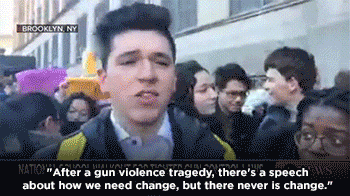


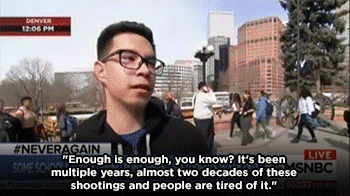



Tens of thousands of students across America walked out of school today to demand action on gun violence. Listen to what they had to say.
42K notes
·
View notes
Text
You Are Going To Have So Much Success In 2018 (pass it on)
697K notes
·
View notes
Text
I realize that when most people think about interpreters, they either confuse them with translators or just imagine them as boring people who sit in a box all day and repeat the boring speeches politicians give at conferences. Somehow I doubt that most people have ever thought about how important interpreters have been for the way we communicate and how the world today would not be the same without them. And I also doubt that people have ever viewed interpreters as badass or as heroes. Therefore, I’d like to tell you about:
The Interpreters at the Nuremberg Trials
I guess most of you already know what the Nuremberg Trials were, but here’s a short explanation for those who don’t: The Nuremberg Trials were a series of military tribunals, held by the Allied forces after the Second World War. They took place in the city of Nuremberg and they were most notable for the prosecution of prominent members of the Nazi leadership. As the people involved with the trial were American, British, French, German and Russian, it had to be conducted in four different languages. Which is why they needed interpreters.
I recently went to an exhibition about those interpreters and even though it was a really small one, it was super impressive- because of what I learned about them.
Here are some of the most interesting and impressive facts:
· Before the Nuremberg Trials, simultaneous interpreting did not exist. Before the trials, people believed that the human brain was not capable of something like that. The simultaneous interpreting equipment used for the trials was the very first of its kind.
In this video you can see a demonstration of the simultaneous interpreting system. Later you can also hear some of the interpreters’ interpretations:
youtube
· None of the interpreters had ever worked as a simultaneous interpreter before. (The reason was, of course, that this profession had not existed before the trials.) Some were translators, consecutive interpreters or linguists, and others were ordinary people who had grown up bilingually, or people who had fled from Germany before the war and lived abroad for a while. The bar was set very high and they had to pass difficult and complex tests, including mock trials, before they were allowed to interpret at the tribunals. Since none of them had any kind of experience with simultaneous interpreting, they had to train themselves in a very short time.
· Without simultaneous interpreting, the Nuremberg Trials would have taken much longer or might not even have been possible at all. Before the trials, only consecutive interpretation was used. (With consecutive interpretation, the speaker stops every few minutes and the interpreter repeats what he said in the target language.) Since there were four court languages (English, German, French and Russian), using this interpreting technique would have prolonged the trials significantly. As the Cold War started soon after the end of the tribunals, it is unclear whether they could have been finished, had they taken any longer.
· Simultaneous interpreters were not the only language professionals working at the trials. If a witness spoke neither of the four court languages, consecutive interpreters were brought in to interpret their testimony- which was then interpreted again by the simultaneous interpreters. There were also interpreters sitting behind the judges to help them communicate. The American and the British judge were seated next to each other, so they could exchange their thoughts, but if they wanted to talk to the French and Russian judge, they needed the help of their interpreters. Translators also worked at the trials. They translated the notes taken by the court reporters in shorthand. These translations were then compared to recordings of the simultaneous interpreters’ interpretations, to make sure that they hadn’t made any mistakes which could influence the outcome of the trials.
· In total, the team consisted of approximately 50 interpreters, 200 translators and 100 people who compared the interpretations with the court reporters’ shorthand. Of course, this generated a lot of paperwork. One photo taken by the American military photographer Ray D’Addario shows employees in the court’s document room standing literally ankle-deep in translation paperwork.
· Interpreters at the trials worked 85 minute shifts on their own. (In contrast, simultaneous interpreters today work in teams of two and take turns in shifts of up to 30 minutes.)
· Sometimes, interpreters were not able to finish their shift- not because of exhaustion, but because they could no longer handle the psychological strain and could no longer force themselves to listen to what was being said. The trials dealt with the worst atrocities committed by the Nazis- war crimes, genocide, mass murder and crimes against humanity. Many interpreters had to be replaced -either because they left or because they returned to the translation department- and later many said that they had nightmares because of those trials. One interpreter, however, also said that he didn’t really catch all the details of what was being said, because he was always way too focused on getting the grammar and the vocabulary right. (And yes, that happens. A lot.)
· One of the most famous photos of an interpreter at the Nuremberg Trials does not actually depict an interpreter. The photo in question shows a young woman in a red suit wearing headphones and explaining the simultaneous interpreting system to the press. However, she was not actually an interpreter, but a lawyer’s secretary. The reason she was chosen as a model for this photo was that she always had the most fashionable suits, because her mother was a tailor.
· Interpretations and Translations could influence the outcome of the trials. The fact that recordings of simultaneous interpretations were checked against the translations of the court reporters’ shorthand limited the risk of communication mistakes, but could not eliminate it completely. Many Nazis, like Göring for instance, tried to use this to their advantage- which, of course, put the interpreters under immense pressure to get everything exactly right. Richard W. Sonnenfeldt, the lead interpreter for the prosecution, remembered Göring asking him: “Could you find me a good lawyer? Although I might need a good interpreter even more than a lawyer.” After the trials, some defendants claimed that they had only been found guilty because of translation or interpretation mistakes. Interpretation or translation mishaps could also negatively affect the prosecution, though. A mistranslation of the word “Freimachung” (translated with “liberation” instead of “clearing”) caused a big problem for chief prosecutor Robert H. Jackson during his first confrontation with Göring in court. Of course, some words also have more than one meaning. And sometimes, one meaning was more incriminating than the other. Those words quickly became bones of contention.
More about the equipment
· Unlike interpreters today, the interpreters at the Nuremberg Trials did not have soundproof booths. Therefore, they had to be careful to not be distracted by ambient noise all the time. Their booths were nicknamed “the aquarium” because they were made of glass. However, those booths were not even closed glass boxes. There was one big glass panel in front of them, and smaller glass panels were used to separate the booths. The headphones were not soundproof either, and probably also not very comfortable.
· Everyone had to wear headphones, except for the guards. There were more than 300 headphones in the court room at all times.
· Each interpreter had a sign which said “slow”. They would hold it up if they wanted the speaker to talk more slowly. If a speaker did not see this (or ignored it), either the interpreters or a technician could push buttons which would light up differently coloured lights on the speaker’s table. The orange light told the speaker to slow down and the red light was a signal that there was a technical problem and the session had to be suspended until this problem was fixed.
What influence did those interpreters have on the future?
· Together with other interpreters who worked at the trials, Colonel Léon Dostert, the head of the interpreters at the tribunals, founded the United Nations Interpretation Service. The technology used in Nuremberg became the basis of modern interpreting technology and ever since the Nuremberg Trials, simultaneous interpreting has become an integral part of international politics and diplomacy. Without simultaneous interpreting, international institutions like the UN, NATO, the EU or the WTO would look completely different today.
These interpreters did something that was considered to be impossible before the Nuremberg Trials. People believed that the human brain was not capable of simultaneous interpretation and yet those interpreters did it. In a short time, they taught themselves how to do it. They worked with newly developed equipment that was far from perfect: Uncomfortable headphones, people tripping over cables and no soundproof booths. They worked shifts which were nearly three times as long as shifts today, and all the time they had to listen to descriptions of the horrific atrocities committed by the Nazis. But even though they were constantly faced with these horrors, even though they were under immense pressure- the interpreters, translators, and other language professionals involved with the trials still did their job. They all put themselves through immense stress, psychological strain and possibly trauma, to make the trials happen and to make sure that Nazi war criminals received the punishment they deserved. Without those interpreters and translators, it would not have been possible. The simultaneous interpreters in particular were pioneers of their profession. Without them, simultaneous interpreting might not even exist. And without simultaneous interpreting, international institutions like the UN or the EU would look completely different today. The world might look completely different, too. After all, during the Cold War, fast communication with people who spoke different languages was essential. Who knows what might have happened without interpreters?
So, yeah, I don’t want to hear people calling interpreters boring ever again.
Just in case you’re interested in hearing more about this topic from someone who has actually lived through all this; here’s a speech by Siegfried Ramler, one of the interpreters who worked at the Nuremberg Trials:
youtube
[Finally, I’m not a historian or anything like that; I’m just telling you what I learned at the exhibition and from a few articles about it, because i found it interesting and super impressive. So if there’s anything that’s not correct, I apologize. Please let me know and I’ll correct it at once!]
2K notes
·
View notes
Text
Selling extra ticket to Lee Jong Suk’s Fanmeeting
I have an extra ticket for Lee Jong Suk’s fanmeeting. It’s on the 2nd floor in B2 section( first couple of rows). I paid 75,000won for each so I’m selling it at the same price. You can PM me for details.

4 notes
·
View notes
Text
Selling extra ticket to Lee Jong Suk’s Fanmeeting
I have an extra ticket for Lee Jong Suk’s fanmeeting. It’s on the 2nd floor in B2 section( first couple of rows). I paid 75,000won for each so I’m selling it at the same price. You can PM me for details.

4 notes
·
View notes
Text
Selling extra ticket to Lee Jong Suk’s Fanmeeting
I have an extra ticket for Lee Jong Suk’s fanmeeting. It’s on the 2nd floor in B2 section( first couple of rows). I paid 75,000won for each so I’m selling it at the same price. You can PM me for details.

4 notes
·
View notes
Text
Selling extra ticket to Lee Jong Suk's Fanmeeting
I have an extra ticket for Lee Jong Suk's fanmeeting. It's on the 2nd floor in B2 section( first couple of rows). I paid 75,000won for each so I'm selling it at the same price. You can PM me for details.

4 notes
·
View notes
Text
Usually, you can look it up in the foreign page. If the event doesn't appear, it means they will only be selling through the Korean one. I went to his fanmeeting last year but, I don't remember seeing it on the foreign version of it (different site last time).
will this Jongsuk’s fanmeeting gonna sale the ticket in Auction foreign page? I’m planning to go for a meeting (tbh I’ve already booking the guesthouse lol) but I’ve no idea if they sale only on Korean page.. (since I can’t sign up if I don’t have Korean Phone number…)
11 notes
·
View notes
Text
okay so here’s what’s going the fuck on in puerto rico.
monica puig, puerto rican, 22, ranked #34 in the world, got to fucking olympic finals in single women’s tennis. meaning she indirectly beat serena mcfucking williams. tonight, she went against #2 worldwide, angelique kerber, playing for germany.
and our amazing athlete and person, monica puig, beat that and just won us our first gold medal.
now, compare puerto rico and germany as countries. germany is a world power. puerto rico is a little island in the caribbean no one gives a fuck about. germany is rich. puerto rico is drowning in a $70billion debt no one in the world will talk about (which frankly surprises and disgusts me).
and we just beat the best of the best in worldwide women’s tennis.
we heard our anthem blaring in the speakers of the rio olympics.
we saw our flag, that for some time in the 1950′s we were forbidden to even own, fly on top of the rest.
and i have never been prouder.
3K notes
·
View notes
Photo



In an event that fans had an expected outcome coming into Rio, Mónica Puig unexpectedly beat TWO top-5 seeds and fought through multiple deuces in a three-set championship match to give Puerto Rico its FIRST gold medal.
Only her second final of her career, she is now the lowest seed to ever win gold in women’s singles.
Incredible job, Mónica.
Photos (via Twitter): @olympics, @nbcolympics, @nbc6
16 notes
·
View notes
